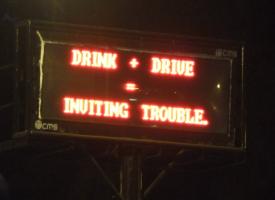For such a simple offense, DUI is a very complicated crime. In its purest form DUI is the operation or physical control of a motor vehicle by a person at a time that the person’s abilities are impaired by alcohol (or a controlled substance).
Don't forget impairment starts with the first drink and driving impaired is a crime. – National Highway Traffic Safety Administration radio script
- Simple DUI – which involves a first time offender and a relatively low breath alcohol or blood alcohol content.
-
 Multiple Offense DUI – which involves people who have been arrested more than once for DUI.
Multiple Offense DUI – which involves people who have been arrested more than once for DUI. - Felony DUI – A person who has four or more DUIs is usually charged with a felony offense.
- DUI with High Blow – In some states there is a “legal limit” that is relatively low, such a .08 or .10. Then there is an additional “higher limit” such as .15 or .20 which allows the State to seek harsher penalties in addition to that of the DUI charge.
- DUI with Child in Car Under Age of 18 – in some states, having a child in the car while you are DUI enables the State to ask for additional penalties such as fines or jail time.
- DUI with Property Damage – If you damage a car, building, or other personal property while you are operating your car under the influence of alcohol you can be charged with DUI and Property Damage.
- DUI with Bodily Injury or with Serious Bodily Injury – if you are operating a vehicle while under the influence and as a result a person is hurt you can be charged with DUI with Bodily Injury. If they are hurt very badly then you are charged with Serious Bodily Injury.
- DUI Manslaughter – If you’re driving while under the influence and you kill someone, then you can be charged with DUI Manslaughter.
- DUI by Minor or Person Under 21 – there is a “Zero Tolerance” policy in most states for underage drinkers who drive. This means if you are under 21and you have any type of breath alcohol or blood alcohol level you can be arrested. Even if you blow underneath your state’s “legal limit” you will be taken to jail and charged with DUI.
Note that most people are charged with a simple or first time DUI. For purposes of this section we will deal with simple DUI because the elements of a simple DUI must be proven in all DUI cases. The Defenses and issues are also the same in many of the other types of DUI charges that can be brought. We will also focus on DUIs charged as a result of alcohol and not those that involve controlled substances or prescription drugs. A detailed outline of the other DUI crimes is included in the DUI section.
(Jump to DUI Penalties.)
DUI Basics
The basic elements to the crime of DUI are
- Driving a Motor Vehicle
- While under the influence of an alcoholic beverage
- To the extent that the person’s abilities are impaired
It sounds simple enough. But to prove the charge of DUI the State actually has a very high burden. Each of those elements is very complicated and has a plausible defense.
Element #1 – Were You Driving?
In order for the State to even start a DUI prosecution, they must be able to show that you were driving the vehicle. The term “driving” sounds pretty simple. But it can actually be broken down into two different categories. These are “operating” and “physical control.”
What is “operating” a vehicle?
Operating a vehicle is what we think of as driving. It is the control you have over the vehicle as you make it go. It means steering a vehicle, making it go forward or backward, or hitting the brakes. When you start the car and pull out of the parking space you are “operating” the vehicle.
If you are actually operating the vehicle when you are pulled over for DUI, this first element is pretty easy for the State to prove.
What exactly is “physical control”?
Physical control means that you have the ability to immediately start operating the vehicle. You can have physical control over a vehicle without operating it, but you can’t operate a vehicle without physical control. When you sit in the front seat with the keys in your hand you are in physical control. If you are outside of your car putting the key in the lock to get into the car that is also physical control. In both cases you can immediately start the vehicle.
The theory behind physical control is that an officer should not have to wait for a person to actually drive and endanger another person’s life before they make an arrest.
Some states take this to the extreme. In some states, if you are sleeping in the back seat and the keys are in the ignition that can be considered physical control. The reasoning is you can wake up at any time and start the car. But if the keys were in the trunk or the glove box, you would be OK because you would have to go through a series of steps in order to start the car. So it is not immediate.
Element #2 – Were You Under the Influence?
Contrary to popular belief, unless you are under the age of 21 it is not illegal to have a drink and drive. It is illegal to drink to the point where your abilities are impaired and drive.
In order to be under the influence you have to ingest some type of alcoholic beverage In some cases, such as with diabetes or mental illness, a person may be impaired but not under the influence.
What is the difference between drinking and driving and driving when you are impaired?
When you drink, alcohol enters your bloodstream. As the amount of alcohol in your system increases, your physical abilities decrease. The rate at which your body processes the alcohol is different for each person. Some people can drink a lot and still function. Others have one drink and are practically falling out the door. So it is possible that two different people could drink the exact same thing but one person would have had a drink and now be driving while the other would be driving while they are impaired.
In order to prosecute those who are impaired the States have developed two different standards. These are the breath or blood alcohol standard and the “normal faculties” standard.
Element #3 – What Does it Mean to Be Impaired?
To be impaired means that you are not functioning at your normal level. The States have developed two separate ways to measure impairment: "Blood or breath alcohol" and "Normal faculties or abilities".
Blood Alcohol or Breath Alcohol Content
In some states you are required to submit to a blood draw in order to measure the level of alcohol in the bloodstream. In other states you blow into a machine known as an Intoxilyzer. In either case the test will measure the percentage of alcohol in your system. This is known as a “BAC.”
No matter which method your state uses, there is usually a BAC “limit” in which you are presumed to be impaired. In some states it is .08. In others it is .10. If you have a BAC wither by breath or blood that is at this level or above, you are presumed to be impaired under the law.
Abilities or Normal Faculties
If there is no blood or breath alcohol test, the standard the state will have to meet is whether or not your normal faculties or normal abilities are impaired. “Normal faculties or abilities” is defined as, “To include but not limited to the ability to see, hear, walk, talk, judge distances, drive an automobile, make judgments, act in emergencies and, in general, to normally perform the many mental and physical acts of our daily lives.”
In cases where the State intends to proceed on this theory it is important to show that you were walking correctly, that you were speaking and answering questions correctly and that you were not swaying or exhibiting the symptoms that most people associate with being drunk.
DUI Defenses
There are several ways for an attorney to challenge a Dui charge. Each involves a complex portion of the law. There are several common defenses.
Challenging the Stop
There are certain circumstances that allow an officer to pull you over and investigate you for a DUI charge. If the officer did not follow the guidelines for stopping you to investigate your condition, your attorney may be able to file a motion to suppress. In the motion your attorney will allege that the officer made a mistake when he pulled you over. If you win, the case is dismissed. If you do not, the case proceeds to trial or you enter a plea.
Challenging the Arrest
If there is enough evidence to pull you over to investigate the crime of DUI, there may not be enough evidence to support an arrest. An arrest must be supported by probable cause that you committed a crime. In some cases, the attorney can challenge whether there was enough evidence obtained in the officer’s investigation to warrant probable cause. If you win, the case is dismissed. If not then the case goes forward for trial or a plea.
Challenging the Role in Vehicle Operation
In some circumstances, there could be a case of mistaken identity or an officer may assume that you were driving a car when you were not. If you were not actually driving, you may have a defense against physical control. Maybe you did not actually have the keys. Or it is possible that you were not close enough to the car for physical control to be properly considered.
Challenging the Blood Draw or Breath Test
This is the most litigated part of DUI cases.
Blood Draws
In jurisdictions that offer breath testing as the primary means for measuring BAC, an attorney can challenge the officer’s decision to ask for a blood test. If blood testing is not mandatory there is certain criterion that must be met in order to request blood. This is because intruding into the human body is seen as the worst type of government intrusion. If the criterion is not met the blood sample may be suppressed.
If there is a valid reason for taking a blood sample, there are procedures in place for how the sample must be taken. These procedures ensure the accuracy of the result. if the procedure is not followed, this could be another reason to exclude the blood testing results.
There are strict circumstances for preservation of blood samples once they are taken and sent for testing. If the procedure is not followed it could be yet another reason to exclude the blood.
Breath Machines
There are several challenges that arise when the Intoxilyzer is involved.
- The 20 minute Observation Period – In order for the results of the machine to be accurate, an officer or licensed professional must observe the person who is about to take the test. During this 20 minute period the officer must make sure that the person to be tested does not burp, throw up or ingest any substance that could affect the test. If this procedure is not followed the result may not be accurate and the results could be suppressed.
- The machine Itself – The Intoxilyzer is a complicated machine. There are several legal challenges to its accuracy and whether it properly measures the amount of alcohol in a person’s system. These challenges are complicated and involve engineering experts. They are also very pricy. There are few jurisdictions that are willing to grant challenges of this kind in a DUI case.
- Certification of the Operator – If the person who operates the machine does not have a certification, the result can be invalid.
- Maintenance of the Machine Itself – Because the Intoxilyzer is a complex instrument, there are several steps needed to maintain it. A good attorney knows what steps need to be taken and can obtain the proper records to make sure that the maintenance has been properly executed. If it is not the result can be inaccurate.
Challenging Your Impairment
Alcohol affects different people in different ways. When your attorney challenges your impairment he will do it in one of two ways.
For States Using BAC
If your state follows a law that states you are impaired at a certain BAC, such as .08 or .10, your conviction is not automatic. This level creates a PRESUMPTION of impairment. This means, the jury is allowed to presume that if you have that much alcohol in your system you are impaired.
When challenging these cases the attorney will either challenge the machine’s result or try to rebut the presumption. This means the attorney will put on evidence that due to your drinking pattern, size or both, you are able to function normally with a BAC at that level and therefore you were not impaired.
For States Using Impaired Ability or Normal Faculties
The attorney will try to present that you were not speaking in a slurred tone, that you did not sway while standing, that you could walk, talk and drive in a normal way.
There are several other defenses that are available but these are the most common. In order to find all of the defenses available to you, you should contact an experienced defense attorney who specializes in DUI.
DUI Penalties
There are several mandatory penalties for a DUI conviction. The mandatory terms for all DUI sentences are
- Probation – When a person is put on probation they are required to report once a month to a probation officer. When they report they must show the progress that they have made in their case. This means turning in community service hours or money for fines and court costs. You must also ask for permission to leave the county or change your address when you are on probation. If you do not meet all the terms of your probation, a warrant is issued for your arrest.
- Community Service Hours – These are hours that are to be performed at a non-profit agency for a specified period of time. Non-profit agencies include churches, the Salvation Army, Habitat for Humanity and the ASPCA. In DUI cases the normal range for the required amount of hours is 25 to 100 for a first offense.
- Fines – In every DUI case there is a mandatory fine. For a first time DUI this fine ranges from $100 to $1000 depending on your state. This is over and above the court costs for prosecuting your case.
- License Suspensions – When you are convicted for a DUI, you lose your license for a specified period of time. In all states the minimum license suspension for a first time DUI is six months. The maximum for a first time DUI is usually one year. If you have more than one DUI, or if it is a more serious type of DUI the suspension is longer.
- DUI School – DUI School is a program that must be completed upon a DUI conviction. The first level of DUI School teaches the effects of drinking and driving. If you have to take advanced DUI School it teaches about the affects of alcoholism on driving.
- Alcohol Counseling – Alcohol counseling is a part of DUI School. When you register they will do an assessment to determine if counseling is necessary, and if so how much. It could be nothing or it could be a recommendation for inpatient treatment. Most people have to do weekly alcohol sessions for a period of 8 weeks.
- Vehicle Impoundment – When you are convicted of DUI you must impound your vehicle for a period of time. On a first conviction it is usually 10 days. In some states you have to physically take your car to an impound lot. In other states they place a boot on your car. In either case you must pay for the impound.
What Are Other Punishments for a First Time DUI Conviction?
The terms listed above are mandatory for all DUI offenses. But there are other punishments that you may receive as well. These are
- Jail Time – Some states have mandatory jail sentences for DUI charges. Some states require jail for all DUI convictions. Others only require jail for DUI convictions with certain aggravating circumstances such as a high blow. Or a judge could determine that given your criminal record or the specific facts of your case that you should be sentenced to jail time. Most first time DUI charges are punishable by not more than one year in the county jail.
- Ignition Interlock Devices – An ignition interlock device is a machine that attaches to the ignition of your car. In order to start the car, you must blow into the device to show that you do not have any alcohol on your breath. If you do the car will not start. After you start the car you must continue to breath into the machine every 20 minutes to keep the car running. This is to make sure you do not drink after starting the car and proceed to drive.
- Victim Impact Panels – This is a one hour class in which people who have had family members killed by drunk drivers or who have been harmed by drunk drivers themselves come and share the impact drunk driving has had on their lives. It is a very graphic and solemn hour of intense emotional storytelling made to make people think about the impact their actions have on others.
Are There More Consequences I May Have to Face?
Yes. There are several other consequences that can arise as a result of a DUI charge. In addition to having a conviction on your record, you may have raised insurance rates. In addition you will have to purchase an SR22 policy. The rate increase for these two types of insurance can be $2000 a year.
If you work in the healthcare industry or hold a security license, you may lose your professional license. Other types of professions such as the bar association and teaching associations can put you on probation.
If you are not a U.S. Citizen a DUI may subject you to deportation proceedings. It doesn’t mean you will be deported but it may cause a proceeding to be held to determine your status.
Having a DUI does not seem like a big deal. But it may have more impact on your life than you think. Before you enter a plea to DUI make sure to consult with an experienced attorney.




